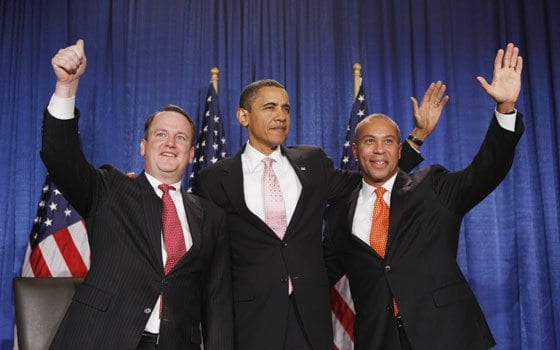
Massachusetts Gov. Deval Patrick largely stays above the political fray, not because of his Ivy League background, but because of his scrappy No. 2.
Lt. Gov. Tim Murray was educated in New York City and schooled in the council wards of Worcester, and he provides the punch to the Democrats’ re-election campaign.
“Listening to Charlie Baker talk about fiscal responsibility is like getting lectured on abstinence from Paris Hilton,” Murray said recently, referring to the leading Republican challenger to him and the governor. “This is the guy who wrote the Big Dig financing plan, which literally, literally bankrupted the transportation system of this state. I’m anxious to get into that discussion.”
Murray is the pragmatic counterpoint to Patrick’s theoretical ruminations, the partner in their lofty political team who makes the trains run on time.
“I’m going to talk about our accomplishments, which I think are many, during the course of this campaign,” Murray told The Associated Press last week during an interview. “And that’s what campaigns are about: It’s about talking about our record, talking about their record, and comparing and contrasting.”
The Patrick-Murray administration is the product of a shotgun marriage of sorts. Murray, the former mayor of Worcester, emerged out of a three-way field for lieutenant governor in 2006.
Patrick himself had to beat back Attorney General Tom Reilly and education activist Chris Gabrieli for the Democratic nomination. They ended up joined in the general election campaign.
While Murray was only 38, he was a veteran politician who provided practical campaign advice to Patrick. At age 50, he was a corporate lawyer and former Clinton administration official was making his first foray into elective politics.
Since taking office, Patrick has charged Murray with maintaining the administration’s relationship with cities and towns, as well as leading outreach efforts to homelessness and veterans groups.
Yet Murray has provided equally valuable service tending to the political garden. He has far out-raised the governor, and handled basic tasks such as representing the administration across the state. There are Murray political signs — even if where there is none for Patrick — from Pittsfield to Peabody.
The now 41-year-old lieutenant governor also has played alpha dog in the administration’s sled team.
“They can call me as many names as they want; it’s not going to change the fact that Charlie Baker was the architect of the Big Dig franchising scheme that has bankrupted the state’s transportation system,” Murray said after House Republicans branded him the governor’s “butler.”
“It’s led to the deplorable condition of our roads, rail and bridges, and every time people hit a pothole, they should think, ‘Charlie Baker,’” Murray added.
In reality, there’s more to the gubernatorial field than Baker and his own running mate, state Sen. Richard Tisei (R-Wakefield). Worcester activist Grace Ross says she’s also running for the Democratic nomination, and Baker is battling convenience store magnate Christy Mihos for the GOP nod.
State Treasurer Timothy Cahill quit the Democratic Party to run as an independent, an apparently prescient move following Scott Brown’s upset in the state’s recent U.S. Senate special election. And Jill Stein plans to run as the Green-Rainbow Party’s nominee for governor.
Patrick and Murray, though, are focused on Baker, and the former Weld administration official — and Harvard-Pilgrim Health Care executive — is equally zeroed in on them.
“The governor’s campaign is stuck,” said Baker campaign manager Lenny Alcivar. “Their only hope is the progressive base turns out in a three-way race. The problem is that the vast majority of state voters is concerned about state spending and a government that is not concerned about the everyday needs of the Massachusetts voter.”
Patrick himself disputes the “butler” or “pit bull” tag for Murray.
“He’s not anybody’s anything,” the governor said of Murray. “He’s the people’s lieutenant governor, and he does a wonderful job at it, and he has a wonderful turn of phrase. I think it makes him mad, some of the hypocrisy we deal with from the folks who are challenging us, and it stirs him up. And why not?”
Associated Press






